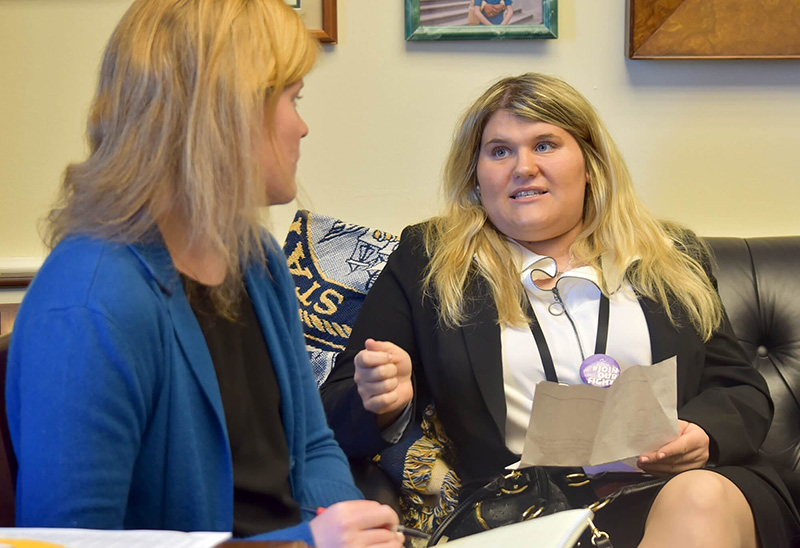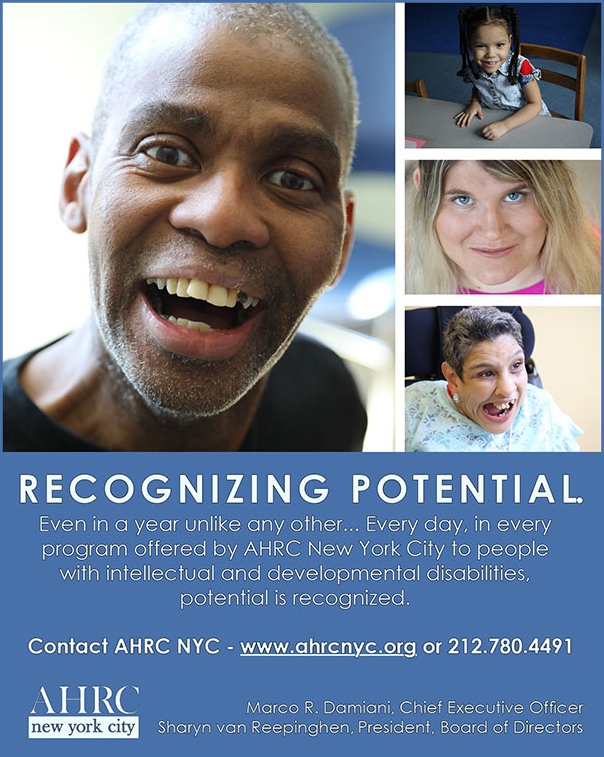I was the girl who was afraid of her own shadow. I was afraid of a lot of things. I was afraid about what people might think. People always doubted me. I was too nervous to speak in front of people. I would never go on stage. I was afraid to do anything.

Danielle Levine makes her case for employment opportunities for people with intellectual and developmental disabilities during a visit with an aide for U.S. Rep. Carolyn Maloney.
A school social worker once told my mom, Sheri, that my IQ was very low and that it was likely to remain at that level. She also said I’d never have the ability to hold a job. She underestimated my ability, and I proved her wrong. (I’m glad my mom continued to have me evaluated, as others did not agree with the social worker’s assessment. I was initially diagnosed with mild autism; that was changed to pervasive developmental disorder and eventually to mild intellectual disability.)
I am a self-advocate for people with disabilities. I have advocated before federal, state and local officials on a variety of issues. I’m sure no one who knew me at The League School would ever have imagined me in this role. I guess I get the advocacy gene from my mom. She really has advocated for me and has been with me since this journey began.
My mom always taught me to believe in myself and that everyone is unique in their own way. I learned from her how to stand up for myself.
Employers Should Recognize the IEP Diploma
One of the areas I’m particularly passionate about is employment. Everybody should have the right to work and earn a living. People with disabilities are no different.
While there are many barriers to employment for people with developmental disabilities, one of the biggest is the Individualized Education Program (IEP) diploma. I graduated with that diploma from The League School at age 21. It’s nearly impossible to get a job because the IEP diploma is not as universally recognized as a high school diploma or GED, better known as high school equivalency diploma.
People with disabilities have a lot to contribute but they struggle to find employment opportunities to do so. We can do more and just want the chance to prove ourselves.
I would like to make it easier for people with disabilities who finish high school to get jobs. It is very difficult to get a job because we face a barrier every time we try to apply for a job or go to an interview. Employers only interview people who have a high school diploma or a GED. I feel that is discrimination and is unfair because I can do just as great as a person who has a high school diploma.
Recently this problem has become worse because most applications for entry-level positions must now be done online. Online job applications do not allow people with IEPs to explain their credentials and instead removes them from consideration for positions before they ever have a chance to get an interview or meet a potential manager.
All we want is for people with disabilities to have the opportunity to get interviews, so we can show employers what we have to offer. I am capable of doing more on the job and if this change is made I and other people with disabilities will have the chance to prove ourselves.
Advocacy Leads to NYS Senate Bill
During my senior year at AHRC New York City’s Melissa Riggio Higher Education Program (MRHEP) at Kingsborough Community College (KCC), I made my third trip to Albany to advocate for change in employment laws. I couldn’t believe it! My work paid off when then-Senator David Carlucci sponsored a bill, S-3890: “Allows the Individualized Education Program or IEP diploma to be accepted whenever a high school diploma or GED is required for employment.” Unfortunately, the bill died in committee.
I was fortunate to attend MRHEP shortly after finishing high school. I developed my advocacy skills and co-taught a class called Advocacy Unlimited to share what I learned with students throughout AHRC NYC and KCC to help them become stronger self-advocates.
Matthew Estep, AHRC NYC’s Self-Advocacy Advisor, reminded me how nervous I was during my first trip to Albany. But after each visit with a legislator or his/her aides, I grew more comfortable. During my last trip, I flagged down a legislator that I had met before to follow up on our meeting; I wasn’t intimidated anymore.
I enjoy mentoring the newer self-advocates and can especially relate to them about overcoming their nerves.
Developing Office Administration Skills
At MRHEP, I majored in office administration. I took typing classes, courses in office communications, and different computer application classes. That’s where I met Tony Angeline, the Corporate Account Developer on the Employment Team with AHRC NYC’s Adult Day Services. He works with many MRHEP graduates.
I told Tony that I was interested in administrative work in a professional office environment. I let him know about my desire to do more than basic office tasks, including filing, shredding documents, etc. I wanted to work on a computer, use a database and deal with clients.
(Editor’s Note: Tony Angeline is the AHRC NYC point person for CCE: The Consortium for Customized Employment,” which is a consortium of 14 agencies in New York City that provide services and support for people with I/DD. This type of consortium is unique to NYC. In his role, he works closely with the Director of the CCE, Karen Waltuck, and the Assistant Director, Wendy Banner. He told them about Danielle and her qualifications for office administration. The CCE contacts agency members with any employment opportunity they develop which might be suitable for a participant. Banner contacted Angeline because she thought Danielle would be a good fit to work in a doctor’s office.)
In January 2020, with Tony’s help, I got a great job as an administrative assistant at a doctor’s office in Herald Square in Manhattan. I loved that job. Unfortunately, four weeks later, the job stopped due to COVID-19. I pray every day that I can return to that job soon.
People with developmental disabilities can do just as great as a person with a high school diploma or a GED. I proved that in college, when I scored the highest mark in my advanced office administration class. I’ll prove it again when I get back to work.
Note: An IEP diploma is different than a high school diploma. Danielle Levine is a fierce self-advocate who wants to promote more employment opportunities for people with autism and other intellectual and developmental disabilities. She is 28 years old (Note: turning 29 on July 8th) and lives with her family in Brooklyn.





